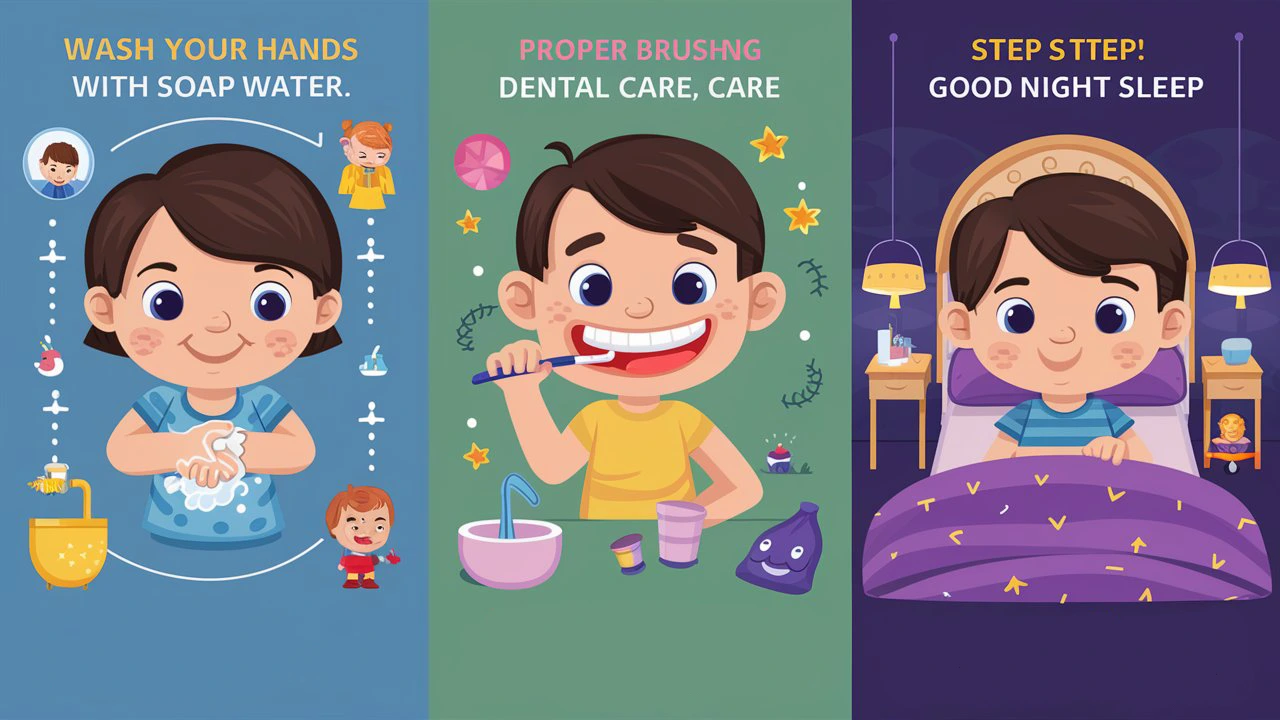Empowering Your Kids with Strong Habits: Essential Steps for Healthy Hygiene, Dental Care, and Sleep
Table of Contents
Introduction
As a parent, teaching your child essential habits like hand washing, dental care, and healthy sleep is one of the most effective ways to support their overall health and boost their immunity. These daily routines aren’t just for hygiene—they set the groundwork for lifelong health, resilience, and self-care. By building these habits early, you’re equipping your child with the tools to ward off diseases, handle daily challenges, and grow into a healthy adult. In this comprehensive guide, we’ll cover why each of these habits is vital, practical strategies to make learning them fun, and how to maintain these routines over time.
Section 1: Why Healthy Habits Matter for Your Child’s Health and Immune System

Healthy habits, like regular hand washing, proper dental care, and a consistent sleep schedule, play a critical role in boosting your child’s immune system. Let’s break down how each habit protects their health:
| Healthy Habit | Benefits for Immunity |
|---|---|
| Hand Washing | Prevents the spread of germs, protecting against colds and flu |
| Dental Care | Prevents oral infections that can weaken the immune system |
| Quality Sleep | Supports immune function by allowing the body to repair itself |
Not only do these habits build immunity, but they also provide emotional benefits, giving children a sense of routine and self-discipline. Establishing them early creates a solid foundation for overall well-being.
Section 2: Teaching Hand Washing – Your Child’s First Line of Defense
The Importance of Hand Washing
Germs are all around us, and young children frequently touch surfaces, making them especially vulnerable to infections. Teaching proper hand washing is the most effective way to reduce their chances of catching illnesses, especially respiratory and stomach-related infections.
How to Teach Effective Hand Washing
- Explain the Concept in Simple Terms
Tell your child that hand washing helps remove “tiny invisible bugs” (germs) that can make them sick. The idea of “washing away germs” can make the habit feel empowering. - Demonstrate Each Step
Show your child how to wet their hands, apply soap, and scrub every part of their hands for at least 20 seconds. Make sure they wash between their fingers and under their nails. - Make Hand Washing Fun
Sing a song or recite a rhyme for 20 seconds to help them understand how long to wash. Popular songs like “Happy Birthday” can be fun while providing a good timer. - Use Visual Reminders
Place colorful signs or stickers near the sink to remind them to wash their hands at the right times, like before meals or after playing outside.
| Step | Description |
|---|---|
| Wet hands and apply soap | Use warm water and enough soap to create a good lather |
| Scrub for 20 seconds | Cover the entire hand, including fingers and nails |
| Rinse and dry thoroughly | Rinse with water, then dry with a clean towel |
Key Times for Hand Washing
Establish specific times for hand washing, so it becomes automatic:
- Before eating
- After using the bathroom
- After touching pets
- After sneezing, coughing, or wiping their nose
Section 3: The Importance of Dental Care for Lifelong Health
Why Dental Health Matters
Oral hygiene is essential for your child’s overall health. Gum disease, cavities, and oral infections can have ripple effects on the immune system, making children more susceptible to other infections.
Steps to Teach Effective Dental Care
- Start Dental Habits Early
You can start cleaning your baby’s gums with a soft cloth even before their teeth come in. As teeth begin to emerge, switch to a soft-bristled toothbrush. - Brush Together for Fun and Learning
Children are more likely to brush regularly if it’s a shared activity. Brush with them twice a day to help reinforce the habit. - Use Kid-Friendly Products
Let your child pick out their toothbrush and toothpaste. A toothbrush with their favorite character or a fun-flavored toothpaste can make brushing more enjoyable.
| Age | Brushing Frequency | Amount of Toothpaste |
|---|---|---|
| Under 3 Years | Twice daily | Smear |
| Over 3 Years | Twice daily | Pea-sized |
- Teach Brushing Technique
Show your child how to brush in small circles on all surfaces of their teeth and encourage them to go slowly to cover each area. Demonstrating gentle brushing helps protect their gums.
Introduce Flossing as They Grow
Around age six, children can start learning to floss to prevent plaque buildup between their teeth. It may take time for them to master flossing, so offer gentle assistance and praise for their effort.
Section 4: The Role of Quality Sleep in Immunity and Growth
How Sleep Impacts the Immune System
Quality sleep is crucial for your child’s physical and mental development. Sleep is when the body repairs itself, strengthens the immune system, and processes new information. A well-rested child is not only healthier but also more emotionally stable and able to focus on learning.
Tips for Building Healthy Sleep Habits
- Establish a Consistent Bedtime Routine
A regular bedtime routine with calming activities like reading or gentle music helps signal to your child’s body that it’s time to wind down. - Create an Ideal Sleep Environment
Make sure their room is dark, quiet, and cool. Avoid screens at least an hour before bedtime to prevent blue light from disrupting their natural sleep cycle. - Set an Age-Appropriate Bedtime
Children’s sleep needs vary by age. Establish a bedtime that aligns with their developmental needs, as shown in the table below.
| Age Group | Recommended Hours of Sleep |
|---|---|
| Toddlers (1–2 years) | 11–14 hours |
| Preschoolers (3–5 years) | 10–13 hours |
| School-Age (6–13 years) | 9–11 hours |
- Model Good Sleep Habits
Children learn from your actions, so showing them the importance of a good sleep routine will reinforce the habit.
Signs of Sleep Deprivation
Look out for signs like irritability, difficulty focusing, or frequent colds, as these can indicate that your child isn’t getting enough rest.
Section 5: Integrating Healthy Habits into Your Child’s Daily Routine
Consistency is key to helping these habits become part of your child’s routine. Here’s how you can make these practices stick:
- Set Clear Expectations
Make sure your child understands that washing hands, brushing teeth, and getting good sleep are non-negotiable parts of their day. - Offer Positive Reinforcement
Praise and reward their efforts to reinforce these habits. Small incentives, like stickers or extra story time, can be great motivators. - Be Patient and Persistent
Developing routines takes time, so don’t get discouraged if they don’t pick up a habit right away. Gentle reminders and consistency are often all that’s needed.
Section 6: FAQs on Building Healthy Habits
Q1: How can I encourage my child to wash their hands regularly?
Use fun soaps, sing songs, or offer small rewards to make the experience enjoyable and help them form the habit.
Q2: What if my child resists brushing their teeth?
Allow them to pick out their toothbrush and toothpaste flavor. Brushing together can also make it feel like a shared activity rather than a chore.
Q3: How much screen time should my child have before bed?
It’s best to limit screen time at least one hour before bed. Engage them in other activities, like reading, to help them wind down.
Q4: How can I tell if my child isn’t getting enough sleep?
If they’re moody, unable to focus, or seem sleepy during the day, they may need more rest.
Conclusion
Incorporating hand washing, dental care, and good sleep into your child’s routine may seem challenging, but these small steps have a huge impact on their health. With consistent encouragement, you’re not only strengthening their immune system but also empowering them with lifelong habits that will benefit them in countless ways. Remember, the time you invest today in building these habits will reward you with a healthier, happier, and more resilient child.
American Academy of Pediatrics (AAP)
The American Academy of Pediatrics is a reliable source for information on children’s health and development. Their guidelines include recommendations on hand hygiene, dental care, and healthy sleep for children.
Centers for Disease Control and Prevention (CDC)
The CDC provides comprehensive recommendations on healthy habits like hand washing and its health benefits, as well as guidelines for healthy sleep practices.
American Dental Association (ADA)
The American Dental Association offers guidance on dental care for children, including recommendations on the right age to start brushing and flossing and the health benefits of good oral hygiene.







